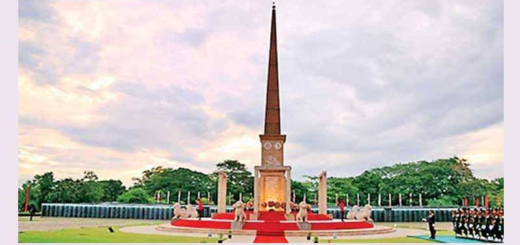CBK calls for talks on foreign judges et al on judicial mechanism
Former President Chandrika Bandaranaike Kumaratunga has called for extensive discussions on far reaching recommendations, including the participation of foreign judges and other personnel in proposed war crimes probe, made by the Consultation Task Force on Reconciliation (CTFRM).
The outfit also called for abolition of the Prevention of Terrorism Act (PTA), demilitarization of the Northern and Eastern Provinces, bifurcation of the Attorney General’s Department to pave the way for Office of Public Prosecutor among other proposals.
Kumaratunga was responding to a query by The Island at a media briefing at the Strategic Enterprise Management Agency (SEMA), Janadhipathi Mawatha, Col. 1, yesterday.
Chairperson of Office for National Unity and Reconciliation (ONUR) Kumaratunga said the decision on CTFRM recommendations could be taken following discussions.
The CTFRM comprising 11 civil society activists led by attorney-at-law Manouri Muttetuwegama on January 3, 2017 handed over its report to Kumaratunga at the presidential secretariat.
The CTFRM comprised Muttetuwegama, Dr Paikiasothy Saravanamuttu, Gamini Viyangoda, Prof. Sitralega Maunaguru, Dr Farzana Haniffa, Mirak Raheem, Prof. Gameela Samarasinghe, Visaka Dharmadasa, Shantha Abhimanasingham, PC, K.W. Janaranjana and Prof. Daya Somasundaram.
Secretary to the CTFRM Dr. Paikiasothy Saravanamutu last week declared that they were unanimous in their call for full participation of foreign personnel in the process.
Asked whether in her capacity as the Chairperson of the ONUR she would back the recommendations, Kumaratunga said that the CTFRM had been established in accordance with a decision taken by the Cabinet of ministers. Although, the CTFRM hadn’t been given a mandate to make recommendations, it came up with certain proposals. “We are not opposed to them. We are not under obligation to implement all of them…”
Kumaratunga briefly dealt with measures taken by the incumbent government since January 2015 to address constitutional reforms and missing persons.
Kumaratunga described the appointment of Muttetuwegama’s task force as something good. Kumaratunga said she couldn’t decide on CTFRM proposals. “The government will have to decide on this,” she said, while acknowledging both President Maithripala Sirisena and Prime Minister Ranil Wickremesinghe had rejected foreign judges. Kumaratunga referred to the ongoing discussion and proposals in respect of foreign observers.
Kumaratunga censured Justice Minister Wijeyadasa Rajapakse for contemptuously rejecting Muttetuwegama’s key proposals.
The Island also asked Kumaratunga whether she could have discussed national reconciliation in a peaceful environment if the military had failed to eradicate the LTTE in May 2009, the former president shot back: “Yes. The Island constantly attacked my peace initiatives, particularly Sudu Nelum movement during my tenure.”
Kumaratunga, went on to explain secret surveys undertaken by her in the South to ascertain the response of the Sinhalese for a negotiated political settlement. Sudu Nelum movement spearheaded by Minister Mangala Samaraweera was meant to reconcile warring communities, Kumaratunga said, adding that a second survey also conducted by the same French agency had indicated that the vast majority of Sinhalese desired peace.
Kumaratunga pursued her peace initiatives in spite of the LTTE resuming hostilities in April 1995 following a 108-day truce. Kumaratunga brought the entire Jaffna peninsula under government control in early 1996.
The ex-President asserted that the electorate’s consent for a new constitution could have been easily secured at a referendum, though some extremists caused mayhem.
Kumaratunga lashed out at the Joint Opposition for undermining post-war national reconciliation efforts.
Commenting on a recent statement made by Tamil National Alliance (TNA) leader R. Sampanthan, MP, regarding the then UNP leader Ranil Wickremesinghe thwarting Kumaratunga’s devolution package in October 2000, the former president regretted the UNPer’s actions. The majority of UNPers today admitted that they shouldn’t have done that, Kumaratunga said, pointing that the new government was now trying to introduce her proposals.
Kumaratunga said that in spite of the LTTE’s defeat, extremism and politics-based on ethnicity posed grave danger to the society. Declaring that she never resorted to such tactics to secure public support, Kumaratunga alleged that some politicians as well as a section of Buddhist monks had been propagating hate and extremism at the expense of national unity.
She said President Maithripala Sirisena never engaged in low level politics.
The former president alleged that the UNP fearing she would consolidate her power if the Oct. 2000 devolution package was ratified by Parliament had scuttled it.


